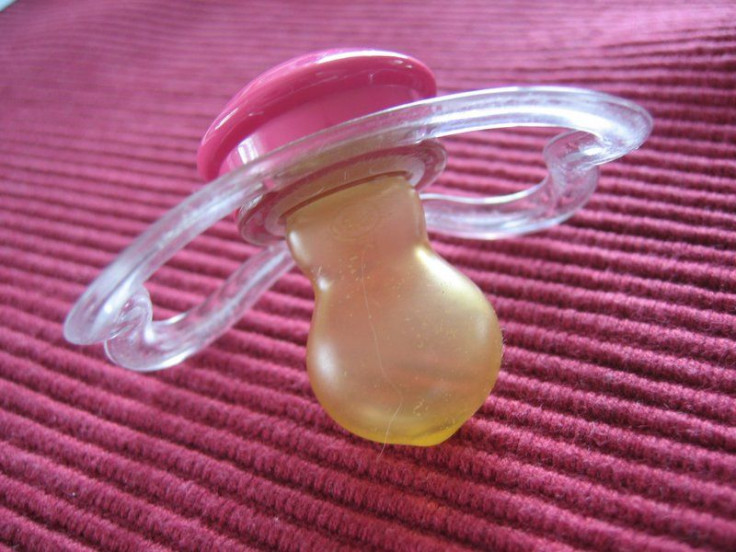Parents’ Saliva On Pacifiers Can Reduce Infant’s Allergy Risks

Those born of parents who keep an immaculately antiseptic house, under the ethos that "cleanliness is next to godliness," may be more likely to develop allergies.
In a recent study, researchers at the Sahlgrenska Academy of Göteborg University in Sweden found that infants whose parents sucked on their pacifiers were less likely to develop allergies, asthma, and eczema compared to those whose parents rinsed or boiled pacifiers.
184 babies and their parents were followed for several years and were tested for allergies, eczema, and asthma in the AllergyFlora study. In every family who participated, at least one parent had allergies, accounting for 80 percent of those surveyed.
74 percent of infants used a pacifier in the first six months. 83 percent of parents used tap water to clean the pacifier, 54 percent boiled, and 48 percent used their mouths; parents could pick more than one option.
The study concluded that by the time the infant reached 18 months of age, 25 percent of children had eczema, 5 percent had asthma, 15 percent had sensitization to food antigens, and 2 percent had sensitization to inhaled antigens.
Although the study shed light on the positive benefits of saliva for tots, negative effects are also possible. Parents who have a mouth sore or an oral infection can easily contribute to the transmission of oral bacteria to their child. The American Academy of Pediatrics (AAP) advises parents to avoid sharing utensils or even cleaning a dropped pacifier with their saliva in order to delay colonization.
Opinions on the effects of oral microbes on infants are divided. The hygiene hypothesis advocates that early increased exposure to viruses, bacteria, or parasites can be beneficial for newborns, according to Dr. James T C Li, M.D., Ph.D.
"The immune system's purpose is to differentiate between harmless and harmful," says Dr. Ron Ferdman, a pediatric allergist at Children's Hospital Los Angeles. "If your immune system is not presented with enough microbes, it just defaults to doing harmful attacks against things that are not harmful, like food, cat dander or dust mites."
There have been links to the effects of mode of delivery and development of childhood diseases in children. "...Thus, vaginal delivery, which is a source for transfer of a complex microbiota from mother to infant and parent and infant sharing of a pacifier might both lead to microbial stimulation, with beneficial effects on allergy development," Dr. Bill Hesselmar, pediatric allergist and author of the study published in the journal Pediatrics, and his colleagues said.
The method of birth was taken into account and proved the hygiene hypothesis to be correct. Babies who were delivered through Caesarean section and had their pacifiers rinsed or boiled were said to have the highest occurrence of eczema at 55 percent. Those that had the lowest occurrence of eczema at 20 percent were born through vaginal delivery and had their parents clean their pacifiers with their mouth.
Therefore, vaginal delivery is a source for the transmission of complex microbiota and the sharing of a pacifier can create microbial stimulation and lower the risk of allergy development.
Cesarean delivery has been correlated with a significantly increased rate of asthma and allergic rhinitis but not atopic dermatitis, reports an article published by the National Institutes of Health (NIH). Furthermore, the risk of asthma was increased by 60 percent in females who had another Cesarean delivery.
It is still undetermined how significant of a role the method of child birth plays on an infant's allergy development. The transfer of saliva for newborns can offer healthy bacterial colonization but can also become the basis for newer diseases that lay ahead.
Published by Medicaldaily.com



























